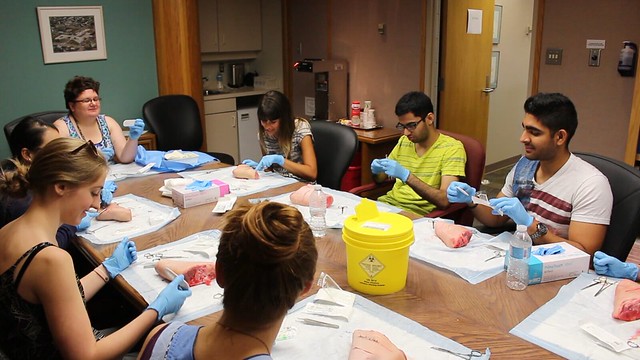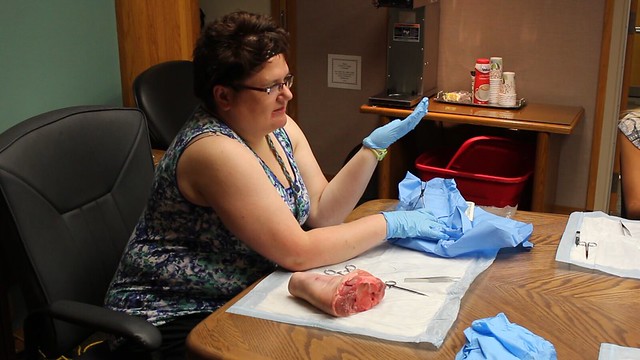Dr. Christina Sereda thinks that you should definitely take part in an RPAP Medical Skills Weekend.
“You’ll have lot of fun,” she explains. “It’s an opportunity get out of the academic setting and to see what things are really like in a rural hospital. It’s not something you’re going get at university. Take the opportunity and ask questions; there is no question that’s off limits. We’re going to be honest with you and we want to give you a balanced idea of what life will be like if you choose rural.”
Dr. Sereda knows what she’s talking about, nine years ago she came to her first skills weekend and it changed her life.
“It was my first year of medical school and it was actually in St. Paul,” recalls Sereda, who currently practices in the small community 200 kilometres north-west of Edmonton. “What impressed me was that there were a lot of things that they could do in the community, both personally and professionally.In terms of jobs, I was impressed by the things that rural doctors could do. For me, that’s where the seeds were planted that rural medicine might be an option.”
“I had considered rural medicine prior to that,” admits Sereda. “But at that point I was an undifferentiated student and was still considering a variety of options. I think that seeing the hospital and the breadth of practice really helped me to consider that path more seriously.”
“I was also impressed by the friendliness of the staff that on a weekend,” remembers Sereda. “Especially that the doctors would care so much about education that they would take a whole weekend off to help out with the students and to get their feet wet in some of these skills.”
“Having exposure to these kinds of events opens peoples’ eyes to what is available in small town communities,” explains Sereda. “I think it may dispel some of the misconceptions and it gives people an opportunity to ask questions and to actually see what the environment is really like, rather than get second hand information.”
For herself, Dr. Sereda thought that isolation would be a big issue in rural practice.
“What impressed me about the doctors on that weekend, however, was how well they worked as a group, how friendly the people were, exposure to the hospital, and seeing that there were ways that the doctors could communicate with tertiary care centres like Edmonton. The access to resources that the doctors had did alleviate some of those fears of being isolated.”
Now, a rural practitioner herself, she takes issue with some of the myths and stereotypes that come with the postal code.
“I think there is that stereotype of the rural practitioner being sort of a bumbling, foggy older person who maybe couldn’t cut it in Edmonton,” explains Sereda. “On the contrary, I think that my colleagues, the rural practitioners have to be sharper, have to be up on their knowledge. They have to have the confidence to go forward and make decisions. And certainly, we do appreciate the specialist, but as rural practitioners we need to be able to think on our feet.”
“As a rural practitioner you’re always looking at the big picture. You’re not looking at systems in isolation. You’re not only looking just at the heart. You’re not only looking just at the lungs or just at the brain – you have to think of the whole body.”
“I think that’s where the attitudes need to change: rural medicine is not your last resort,” concludes Sereda. “It take a special type of person to be here. It takes dedication, a lot of hard work, and a lot of courage to be the front-line person and to take that responsibility. You’re the gate keeper to a big portion of the Alberta population and you’re the one that is helping these people in rural Alberta access care and get the care they need.”
“It is awesome to be a doctor here. It’s challenging and I am never bored,” says Sereda when asked about her career in St. Paul. “There are days that are better than others, but patients are great, the work is rewarding, and you feel like you are making a difference. I wouldn’t have picked any other career. It’s rewarding, it’s challenging, it’s fulfilling. I don’t regret making the decision to go rural and I would do it again in a heartbeat.”


